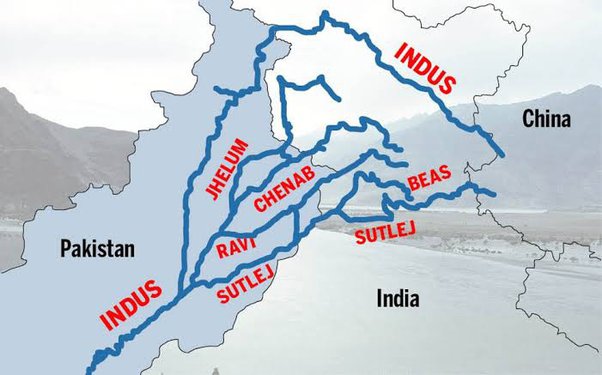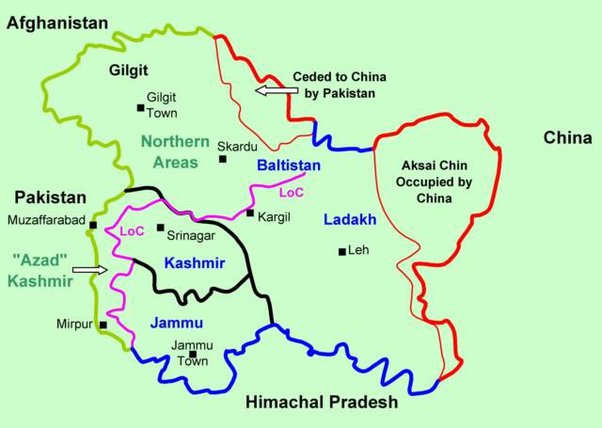India Pakistan Current Affairs
The Instrument of Accession
- The Instrument of Accession was signed by the princely states under the Government of India Act of 1935, to ensure that the rulers of the princely states would join one of the two states of India or Pakistan according to the partition plan.
- At the time, Jammu and Kashmir was controlled by Maharaja Hari Singh, who did not want to sign the Instrument of Accession, but Pakistan was convinced that due to the majority of Muslim population, he would join Pakistan, but that didn't happen. The Raja wanted to get his own official state.
- This angered the Pakistani people. A few weeks after Independence, they unofficially formed a tribal milita, or lashkar. On 22 October 1947, they crossed the border of the state. On the way, they looted Baramulla and stalled. Meanwhile, Maharaja called to India for help, and they assisted, but it was only after he signed the Instrument of Accession to India.
- PM Jawaharlal Nehru was ready to send the troops, but the governor, Lord Mountbatten advised the Maharaja to sign accede to India, and given the emergency, he complied.
- The Instrument of Accession was signed on 26 October 1947.
- In 1948, the fronts solidified until a Line of Control was formed.
- On 23:59 of 31 December 1948, a formal ceasefire was called, and became effective on the night of 1 January 1948.
The real problem of Pakistan however is water. For this reason, they don't care about the people or land of Kashmir.
The Water problem
- Pakistan is situated in a water scarce land
- They are afraid that during times of conflict, India may cut off water supply to Pakistan
- Pakistan is expected to go water scarce soon, while India is expected to go scarce by 2050
- They signed the Indus Water Treaty (IWT) with India in 1960, brokered by the World Bank to use the water available in the Indus System of Rivers located in India.
- According to this agreement, control over the water flowing in three "eastern" rivers of India — the Beas, the Ravi and the Sutlej with the mean flow of 33 million acre-feet (MAF) — was given to India, while control over the water flowing in three "western" rivers of India — the Indus, the Chenab and the Jhelum with the mean flow of 80 MAF — was given to Pakistan.
- More controversial, however, were the provisions on how the waters were to be shared. Since Pakistan's rivers receive more water flow from India, the treaty allowed India to use western rivers water for limited irrigation use and unrestricted use for power generation, domestic, industrial and non consumptive uses such as navigation, floating of property, fish culture, etc. while laying down precise regulations for India to build projects.
 |
 |
|---|---|
India controls the origins of Indus, Jhelum, Chenab, Ravi and Sutlej.
Now, they are no longer fighting for Kashmir, but for the control of water. One can say that the original terrorist attacks have backfired against them in this case.
Solution Ideas
- General Musharaff of Pakistan said that they are okay with a sovereign state of Kashmir. This is because they are concerned with the illegal, undemocratic and unethical occupation of Kashmir by Indians.
- According to the UN, for this, first Pakistan has to drop their weapons, then India has to do the same too. Only then can a separate state be established.
Fears
- Indians fear that if they are given Kashmir, then they will claim the rest of India. I believe this stems from not understanding the issue.
- Pakistanis fear India may cut off water supply, due to the growing population of India, and due to certain projects such as the Kishanganga hydroelectric project.
- Pakistan fears that if their troops retreat, that would mean losing control of Chenab and Jhelub
Arguments
- The IWT has been honoured for over 50 years, so Pakistan's worries are baseless.
- The conflict allows fooling Pakistani civilians and staying in power.
- Pakistan has never dropped their weapons.
Wars
- War of 1947-48
- War of 1965
- War of 1971
- Siachen Conflict (1984-2003)
- War of 1999 (Kargil War)